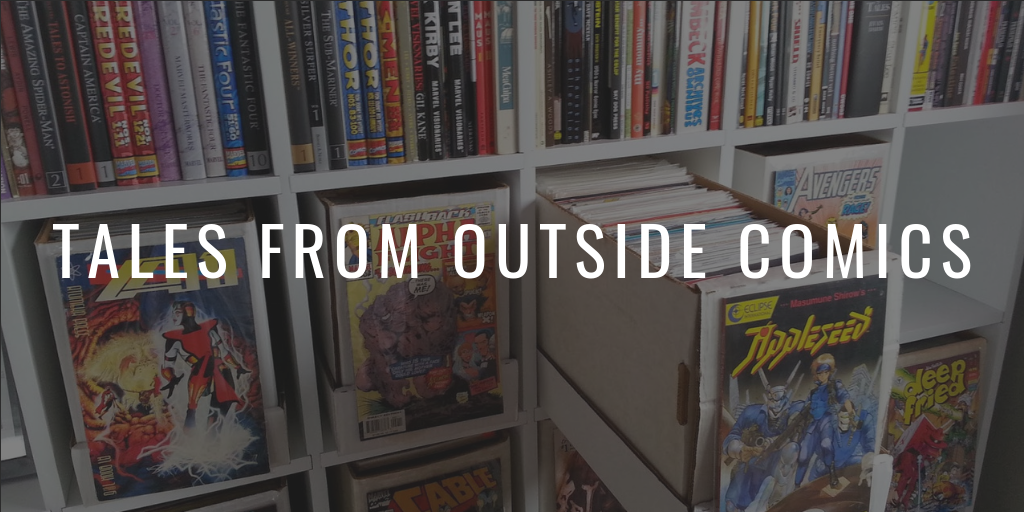Hello, and welcome to the very first “Tales from Outside Comics!” The idea
behind this series of posts is that I’m someone just like you, a wide-eyed hopeful
looking to break into the industry, and I’ll be talking about the things I’ve learned
so far. I’ve read so many stories from pros looking back on how they broke into
comics, and not that those aren’t helpful, but I’m here to share how it looks along
the way. So, join me on the journey, learn from my mistakes, and let’s laugh
about it as best as we can.
The first thing I wanted to talk about is the idea of building yourself a
motivational engine – before any of us sits down to create, we need to gather the
effort to do so. And if you’re just starting out as a writer, this can be one of the
most daunting tasks you’re facing. There’s an entire epic masterpiece swirling
around in my head – how can I ever hope to birth this leviathan before everything
falls apart?!?!?
What I have to tell myself every day is that, just like writing, motivation is a
process. We don’t just wake up one morning and write an entire novel, nor do we
wake up and magically feel like writing. Getting into a groove takes time, effort,
and work of its own. I like to think of self-motivation as a multi-pieced engine
pumping up your creative self to get going, pulling you along one word at a time.
(That’s right – I don’t think self-motivation is just one thing; it’s so many little
things working in unison to help you create and make real what’s in your head).

So, let’s talk about some of the things we can all do to assemble our
motivational engines. A massive hurdle for me was demystifying the position of
Authors. It took me a long time to realize that the people who wrote the stories I
cherished and connected to aren’t some mythical beings; they’re human, just like
me. And if one person can do something, that means you can do it, too.
Part of the process of doing it, of creating anything, is treating yourself like
a “real” writer. If you don’t take yourself seriously, how can you expect anyone
else to? Especially someone you’re asking to publish some creation of yours.
It might sound obvious, but get a desk (literal or figurative – a small table is
really the same thing), that you can use just for writing. Carve out a little space
wherever you live to do your work. (Sure, it can be fun to write in a coffee shop or
bar, but I feel like changing up the scenery only works once in a while, not every
day.) Make it as far away from any tv/video games/distractions as you can. For a
little while, I was using my laptop-desk area for writing and playing League of
Legends. Even when I sat down intending to write, I’d only be at it for an hour or
so before a gaming craving would hit me.
Breaking the habit wasn’t easy, but the first step was as simple as
separating my gaming space from my writing space. I still play video games, but
not where I write. (Which means I haven’t logged on to League in a couple
months now. It wasn’t easy, but I had to be honest with myself about which
activity was more important to me: writing, or playing).
Find little things to keep you motivated. One thing I do is keep a pad of
post-it notes on my desk, and pin inspirational quotes and sayings up on the wall
above my computer. (The one I find myself gravitating to most lately is “failure is
not the opposite of success, but merely a part of it.”) It takes a lot of pre-effort,
but surrounding yourself with positivity and inspiration can go a long way with
time. I’ve also positioned my desk next to a window, so that I get natural sunlight
and can still feel close to the outside world. Just watching trees, clouds, and
squirrels for a bit can keep my mind feeling fresh longer. Like I said earlier, lots of
little things.
Along those lines, actively trying to get better as a writer is something
everyone should do. (Let the Dunning-Kruger effect be a cautionary tale here.)
Reading articles about writing (like this one) shows that you want to get better,
just realize that no one, single tip will contain some magical key to “fix” whatever
you think is holding you back. One book that I wholeheartedly recommend is
Steven Pressfield’s The War of Art. It’s not perfect, but if you’re a procrastinator
(like me), it will call you on your bullshit. And identifying the problem is the first
step to overcoming it.
Another thing that’s been super helpful to me has also been finding writing
groups in my area. Feedback can be vital to knowing whether a piece is working
or not, and associating with fellow creatives is something that really energizes
me. Talking process, comparing tips, sharing where you’re at on the road to
publication; it lets you know you’re not alone. There are other people out there
struggling with the same things you are, trying their hardest to get their stories
out there. Even though writing can feel lonely sometimes, you’re not alone. (Plus,
getting out of the house is always a bonus).
Finally, let’s touch on writing goals. I’ve seen a lot of writers talk about
having word/page count goals to hit every day. In my experience, yeah, I can write
1,000 words a day, but I’m rarely happy with the results. I’m always going to be
someone who values quality over quantity, so if I can get a few hours of good
writing in versus just churning out whatever happens to be on my mind in 20
minutes? That’s a good day. What does good writing look like? That’s another
thing that takes time to find out.
Not only that, but I feel like these goals are something to work towards.
When it comes to comics, I’ve heard several writers say that an issue’s script a
week keeps them on time. I don’t expect myself to be hitting that from day one.
Sure, I wrote a textless one-shot in 2 days, but I’ve been working on the first issue
of a dialog-heavy miniseries for 2 weeks now. Every project is going to come
together differently. At the end of the day, writing goals can be good to have, but
if you end up beating yourself up over them more than hitting them, relax. You’ll
get there, just give yourself time.
Something to remember when it comes to the self-motivating engine is
realizing that feeling good, believing in yourself, it takes active effort. Positivity
isn’t something that’s come naturally to me, and everything I’ve shared with you
here didn’t just fall into place for me. A big part of it, for me, has been getting
help from other people – largely a therapist. Actually, several, over the years,
ranging from just OK to great. Which leads me into the topic for next time; The
Benefits of a Good Therapist. Thanks for reading, and best of luck in your creating.
- Tales from Outside Comics: Throw it in Reverse - March 16, 2021
- Tales from Outside Comics: Story Time with Mr. Scaryface - January 19, 2021
- Tales from Outside Comics: Writing with Tarot - December 16, 2020
